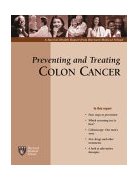
In the book Tell Me What to Eat To Help Prevent Colon Cancer, whose frontpiece graces yesterday's blog entry, there is a Q&A section in which one question is "What causes colon cancer?". Good question. The answer: "Unfortunately, we do not yet know the exact causes of colon cancer."
But the premise of the book is prevention through nutrition. Maybe it's just me or maybe it's the nature of the popular press, but I can't help but wonder how books get published purporting to prevent diseases without having a solid foundation in the research into the causes of such diseases. But they're everywhere! Go into a health section of your local bookstore and you'll find books a plenty claiming to have the answers. Most of them simply tell you to avoid grilled meats, avoid cooking on the BBQ, and eat lots of fiber. Certainly not rocket science...perhaps not even nutritional science.
On the other hand, preventing recurrence of rectal cancer is something about which we can speak authoritatively. The surgical technique of total mesorectal excision (something which I had done) has reduced the incidence of recurring rectal carcinoma to considerably less than 10% (from Rectal Cancer Treatment).
I recognize that cancer prevention is a research area fraught with difficulties, scientific proof being only one of the most obvious. But definitions are also important. Generally speaking, cancer prevention is defined as "all measures that limit the progression of cancer at any time during its course." (Contemporary Issues in Colorectal Cancer: A Nursing Perspective). But there are distinctions to be made.
Primary prevention deals with health strategies for healthy individuals to decrease vulnerability. Secondary prevention deals with high-risk individuals, and tertiary prevention deals with reducing morbidity among those with irreversible or permanent disease. All are important and each has been addressed to some extent in the scientific literature.
My recommendation to those diagnosed with colorectal cancer or to those, like myself, contemplating a transition to cancer survivor status, is to consider reading the scientific literature broadly and avoid the popular press. One way to do so is provided free of charge through Google Book Search. To get a sense of what is available and what is possible with this fantastic tool, check out the following search on the phrase preventing rectal cancer.

No comments:
Post a Comment